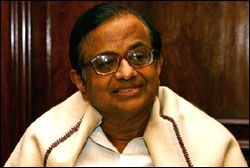 | « Back to article | Print this article |
In an indication of what the Budget could entail, Finance Minister P Chidambaram on Wednesday said he would stick to a five-year road map for fiscal consolidation by looking for a 20 per cent increase in revenues a year without raising taxes but relying mostly on expenditure cuts.
 In his second leg of the two-nation roadshow to sell Brand India, Chidambaram told investors in Singapore he was confident of reining in the fiscal deficit at 5.3 per cent of GDP for 2012-13 and then reducing it by 0.6 percentage points every year to three per cent by 2016-17.
In his second leg of the two-nation roadshow to sell Brand India, Chidambaram told investors in Singapore he was confident of reining in the fiscal deficit at 5.3 per cent of GDP for 2012-13 and then reducing it by 0.6 percentage points every year to three per cent by 2016-17.
This, he said, would be achieved by a stable tax regime, non-adversarial tax compliance and a fair dispute mechanism. These tools, Chidambaram said, would swell the kitty by 20 per cent, according to a note by Bank of America-Merrill Lynch.
The bank hosted a meeting between the finance minister and foreign institutional investors, debt investors and representatives of companies in Singapore. After Mauritius, Singapore is the biggest source of FDI inflows into India.
The government was also counting on savings under the Direct Benefits Transfer scheme, Chidambaram said. Pilot projects indicate a saving of 20-60 per cent by reducing leakages.
For fiscal consolidation in the current financial year, the minister said he was relying mostly on reducing expenditure and bringing in austerity steps. He exuded confidence that the disinvestment target of Rs 30,000 crore would be met, and NTPC will be divested next to bring around Rs 11,000 crore. Public sector companies that don’t meet investment targets by March will be asked to return the surplus money as special dividend to the government, the minister said.
However, the Bank of America-Merrill Lynch note said the target of controlling fiscal deficit at 5.3 per cent of GDP was below consensus, and the bank’s estimate was 5.9 per cent of GDP.
Chidambaram told investors that while the cap for debt investments had been raised to $75 billion, the government was considering making the sub-caps fungible to accelerate investments.
Ahead of the monetary policy review on January 29, he said the finance ministry and the Reserve Bank of India (RBI) worked closely, contrary to perception. Earlier, he had said if necessary, the finance ministry would “walk alone to face the challenge of growth”, after RBI kept the key policy repo rate unchanged in October.
RBI Governor D Subbarao is expected to meet Chidambaram on Thursday to discuss the macroeconomic situation.
Chidambaram expressed hope the insurance and pension Bills would be passed in the Budget session of Parliament. The finance minister said, “Behind the noise, there were quiet negotiations with the opposition parties (to seek) support from them.”
Chidambaram said the possibility of an unstable government after the 2014 Lok Sabha polls would be the biggest threat to reforms.
On Tuesday, Chidambaram met investors in Hong Kong.